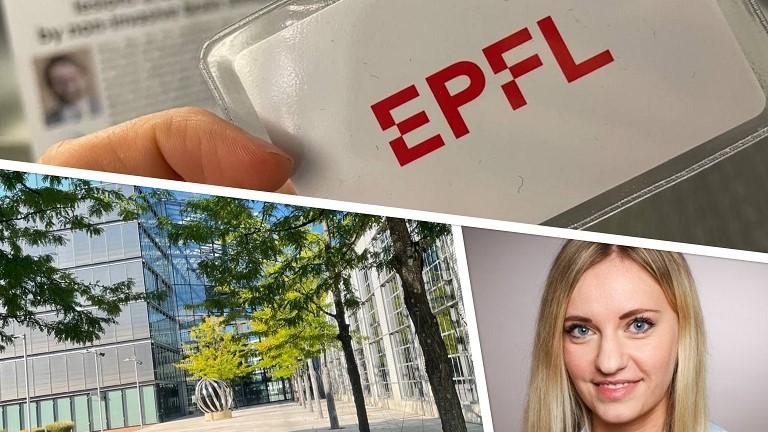
NETWORK OF EUROPEAN NEUROSCIENCE SCHOOLS:SFB 874 supports research training at EPFL in Switzerland
Scientific insights and appreciation for the cafeteria of the Ruhr-Universität
Susanne Dyck has been conducting research in the field of neurotechnology as a PhD researcher at the
Faculty of Medicine at Ruhr University Bochum since 2018 and is a member of the Collaborative
Research Centre 874 (SFB 874). At the Department of Neurotechnology, she works under the
direction of Prof Dr Christian Klaes at the interface between neuroscience, neurosurgery, machine
learning and virtual reality.
In the summer of 2022, the young scientist, who studied in Marburg before coming to the Ruhr
region, completed a twelve-week research training period at the “École polytechnique fédérale de
Lausanne” – EPFL for short – in Switzerland and tells us about her experiences in this interview.
Susanne, what attracted you to do a research training internship?
On the one hand, I wanted to learn a new data analysis method that is relevant to my PhD project – and I wanted to learn it from experienced scientists. Secondly, I wished to combine this with a research stay abroad to get international research experience. I did all my studies in Germany so far, so I was very excited about working as a scientist in another country.
And why Switzerland and the lab of Prof Dr Friedhelm Christoph Hummel*?
The most important criteria for me was to find a research group with expertise in the method I wanted to learn, namely functional connectivity analysis for EEG. Another “nice-to-have” criteria was to find a research group that does research in the area of my PhD topic, namely “Motor Learning”. The Hummel Lab met all of these requirements, and their website also advertised a very exciting project using the method I wanted to learn. For the research training, I applied for the NENS exchange grant, a funding for a method training abroad. Both the host and the home institution have to be part of the NENS network.
(*Defitech Chair of Clinical Neuroengineering, Centre for Neuroprosthetics (CNP)& Brain
Mind Institute (BMI), Swiss Federal Institute of Technology (EPFL))
What exactly did you do during your twelve weeks?
I worked on a data set that was acquired within a larger project. The overall aim is to improve the rehabilitation of stroke patients through therapies that are tailored to the needs of the individual. Stroke patients have been examined at different points after the stroke: with cognitive and motor tests as well as imaging procedures such as MRI and EEG. In my sub-project, I focused on the “resting-state” EEG measurements. The aim was to develop an analysis pipeline for a functional connectivity analysis of these “resting-state” EEG recordings, which can be later also used for other projects and data.
And what was the result of your work?
I implemented a functional connectivity analysis for 24 patients. In addition, I examined another 16 healthy participants – these formed our control group. Finally, I got involved in the visualisation of the obtained data. When I left the Hummel Lab, the project was not yet finished. The final goal is to derive potential markers – based on the functional connectivity analysis – that can provide information about the motor and cognitive recovery of stroke patients.
Was it enough to stay for twelve weeks or would you have liked to stay longer?
I think twelve weeks was an ideal time frame. I had enough time to get used to the new environment and to carry out a sub-project from start to finish. Although I really liked it at the Hummel Lab and Geneva is also a very beautiful city, towards the end of the internship I was also looking forward to returning to my familiar surroundings. Furthermore, I was also motivated to apply the knowledge I had gained during the internship to the data in my own PhD project.
How was the contact with the other lab members?
Very good! I was given a very friendly welcome and the contact between us was amicable. The students’ and PhD students’ office was an open-space office and even the experienced PostDoc staff had their offices right next to it, so that an exchange was possible at almost any time – whether about fun facts over a coffee or about scientific questions. At lunchtime, we all went to the cafeteria together, where you could fortunately also eat what you had brought with you, as the dishes cost at least ten euros there. The stay in Switzerland definitely made me appreciate the RUB cafeteria a lot!
What is your conclusion?
The research stay at the Hummel Lab was a very positive and valuable experience for me. I got to know very nice people which also happen to be very good scientists. I learned a lot and gained valuable skills! For me, it was an important first insight into research outside of Germany.
What are your plans for the future? More internships? More stays abroad?
First of all, I am now concentrating on completing my PhD thesis. In the subsequent post-doc phase, I would like to go abroad for one or two years for a research project.
Thank you very much for the interview and good luck for your future career!
Interview: Anke Maes, Photos: Susanne Dyck private
